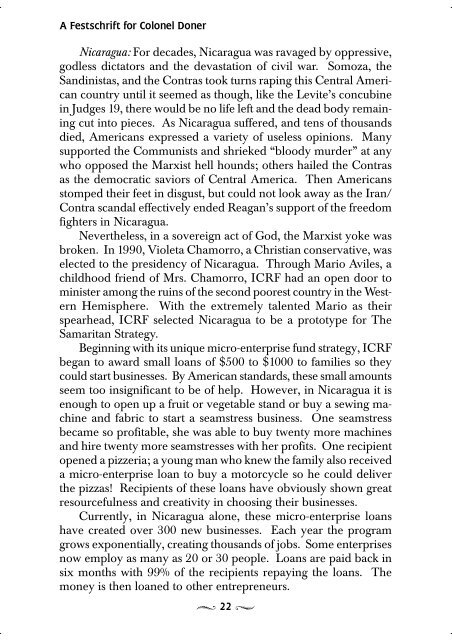A Life of Transformation - World Evangelical Alliance
A Life of Transformation - World Evangelical Alliance
A Life of Transformation - World Evangelical Alliance
You also want an ePaper? Increase the reach of your titles
YUMPU automatically turns print PDFs into web optimized ePapers that Google loves.
A Festschrift for Colonel Doner<br />
Nicaragua: For decades, Nicaragua was ravaged by oppressive,<br />
godless dictators and the devastation <strong>of</strong> civil war. Somoza, the<br />
Sandinistas, and the Contras took turns raping this Central American<br />
country until it seemed as though, like the Levite’s concubine<br />
in Judges 19, there would be no life left and the dead body remaining<br />
cut into pieces. As Nicaragua suffered, and tens <strong>of</strong> thousands<br />
died, Americans expressed a variety <strong>of</strong> useless opinions. Many<br />
supported the Communists and shrieked “bloody murder” at any<br />
who opposed the Marxist hell hounds; others hailed the Contras<br />
as the democratic saviors <strong>of</strong> Central America. Then Americans<br />
stomped their feet in disgust, but could not look away as the Iran/<br />
Contra scandal effectively ended Reagan’s support <strong>of</strong> the freedom<br />
fighters in Nicaragua.<br />
Nevertheless, in a sovereign act <strong>of</strong> God, the Marxist yoke was<br />
broken. In 1990, Violeta Chamorro, a Christian conservative, was<br />
elected to the presidency <strong>of</strong> Nicaragua. Through Mario Aviles, a<br />
childhood friend <strong>of</strong> Mrs. Chamorro, ICRF had an open door to<br />
minister among the ruins <strong>of</strong> the second poorest country in the Western<br />
Hemisphere. With the extremely talented Mario as their<br />
spearhead, ICRF selected Nicaragua to be a prototype for The<br />
Samaritan Strategy.<br />
Beginning with its unique micro-enterprise fund strategy, ICRF<br />
began to award small loans <strong>of</strong> $500 to $1000 to families so they<br />
could start businesses. By American standards, these small amounts<br />
seem too insignificant to be <strong>of</strong> help. However, in Nicaragua it is<br />
enough to open up a fruit or vegetable stand or buy a sewing machine<br />
and fabric to start a seamstress business. One seamstress<br />
became so pr<strong>of</strong>itable, she was able to buy twenty more machines<br />
and hire twenty more seamstresses with her pr<strong>of</strong>its. One recipient<br />
opened a pizzeria; a young man who knew the family also received<br />
a micro-enterprise loan to buy a motorcycle so he could deliver<br />
the pizzas! Recipients <strong>of</strong> these loans have obviously shown great<br />
resourcefulness and creativity in choosing their businesses.<br />
Currently, in Nicaragua alone, these micro-enterprise loans<br />
have created over 300 new businesses. Each year the program<br />
grows exponentially, creating thousands <strong>of</strong> jobs. Some enterprises<br />
now employ as many as 20 or 30 people. Loans are paid back in<br />
six months with 99% <strong>of</strong> the recipients repaying the loans. The<br />
money is then loaned to other entrepreneurs.<br />
22
















